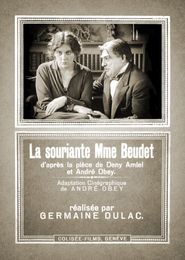La Souriante Madame Beudet
| La Souriante Madame Beudet | |
|---|---|
 | |
| Directed by | Germaine Dulac |
| Written by | Germaine Dulac |
| Based on | La Souriante Madame Beudet 1921 play by Denys Amiel André Obey |
| Produced by | |
| Starring |
|
| Cinematography |
|
Release date |
|
Running time | 38 mins. |
| Country | France |
| Languages | Silent film French intertitles |
La Souriante Madame Beudet (The Smiling Madame Beudet) is a short French impressionist silent film made in 1923,[1][2] directed by pioneering avant-garde cinema director Germaine Dulac.[3] It stars Germaine Dermoz as Madame Beudet and Alexandre Arquillière as Monsieur Beudet. It is considered by many to be one of the first truly "feminist" films.[2][4][5] It tells the story of an intelligent woman trapped in a loveless marriage.
Synopsis
[edit]Monsieur Beudet frequently puts an empty revolver to his head and threatens to shoot himself as a practical joke or to emphasize his frustration. He does this so often that it no longer surprises his wife or friends. One night, Monsieur Beudet gets some theater tickets, but his wife refuses to go with him. While he is gone, Madame Beudet spends some time reflecting on her marriage to a slovenly, unromantic man who does things like lock the lid of her piano when he's upset with her; she puts a bullet into her husband's revolver so he will accidentally kill himself the next time he repeats his joke.
After a sleepless night, Madame Beudet comes to feel remorse for the trap she has set. Unfortunately, that day Monsieur Beudet's office is never unoccupied long enough for her to remove the bullet from the revolver. Monsieur Beudet calls for his wife to ask her about some large household expenses. He gets worked up and, thinking the revolver is empty like it usually is, he points it at himself and then turns it on his wife. He shoots, but the bullet misses Madame Beudet. Monsieur Beudet wrongly surmises that his wife was trying to commit suicide. He embraces her and says "How could I live without you?"
Legacy
[edit]La Souriante Madame Beudet is widely considered to be the first feminist film.[2][4][5] Les Misères de l'aiguille (1914) and its themes of militant feminism, however, predate the 1923 Dulac film.[6]
Cast
[edit]- Germaine Dermoz as Madame Beudet
- Alexandre Arquillière as Monsieur Beudet
- Jean d'Yd as Monsieur Labas
- Madeleine Guitty as Madame Labas
- Raoul Paoli as Le champion de tennis
See also
[edit]References
[edit]- ^ Cheryl Hindrichs (2009). "Feminist Optics and Avant-Garde Cinema: Germaine Dulac's "The Smiling Madame Beudet" and Virginia Woolf's "Street Haunting"". Feminist Studies.
- ^ a b c Colin Marshall (18 November 2015). "The First Feminist Film, Germaine Dulac's The Smiling Madame Beudet (1922)". OpenCulture. Retrieved 17 November 2016.
- ^ "Themes and Variations". Toronto International Film Festival. 2016. Archived from the original on 18 November 2016. Retrieved 17 November 2016.
... the pioneering avant-garde filmmaker Germaine Dulac ...
- ^ a b adamvasco (11 May 2012). "Friday Feature: First Feminist Film". MetaFilter. Retrieved 17 November 2016.
- ^ a b LH (10 September 2012). "La Souriante Madame Beudet [film review]". TimeOut London. Retrieved 17 November 2016.
- ^ Mundim, Luiz Felipe Cezar (July 2019). "As misérias da agulha do Cinema do Povo: um filme feminista no primeiro cinema" [The miseries of the needle of the cooperative Cinéma du Peuple: a feminist movie in the early cinema]. Significação: Revista de Cultura Audiovisual (in Portuguese). 46 (52): 18–19, 35. doi:10.11606/issn.2316-7114.sig.2019.147866. ISSN 2316-7114.
The film was likely one of the first in the world explicitly geared towards representing the themes of militant feminism. ... Miseries can be considered the first openly feminist film, released eight years before La Souriante Madame Beudet ... which is still generally regarded as the first feminist film in the history of cinema.
External links
[edit]- La Souriante Madame Beudet at IMDb
- La Souriante Madame Beudet at the TCM Movie Database
- La Souriante Madame Beudet at Rotten Tomatoes
- The Importance of Being a Film Author: Germaine Dulac and Female Authorship (by Rosanna Maule, Senses of Cinema
- 1923 films
- 1920s feminist films
- 1920s French films
- 1920s French-language films
- 1923 drama films
- Films about suicide
- French black-and-white films
- French drama short films
- French feminist films
- French films based on plays
- French silent short films
- Silent French drama films
- Short silent drama film stubs
- 1920s French film stubs
